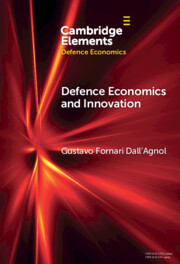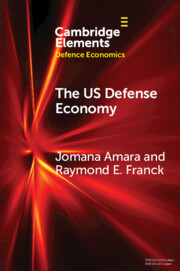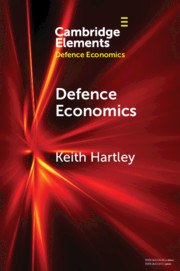Forthcoming Cambridge Elements series
Defence Economics
About this Cambridge Elements series
Defence Economics is a relatively new field within the discipline of Economics. It studies all aspects of the economics of war and peace. It embraces a wide range of topics in both macroeconomics and microeconomics. Theory, empirical and policy issues will be addressed within the broad area of defence and peace economics. Examples include the relationship between defence spending and growth, and the determinants of defence spending. The classic ‘guns versus butter’ choice problem will be addressed as well as assessments of the efficiency of a nation’s defence spending and its defence industries. Data problems and the challenge of measuring defence output and determining whether it is a worthwhile investment will be reviewed.
Other topics to be covered include the economics of military alliances; public goods; arms races: theory and evidence; arms markets; arms industries; arms exports; procurement policy; technical progress and spillovers; including efficiency implications of different types of contracts; cost-benefit and cost-effectiveness analysis; defence inflation.
Further analysis will embrace Defence Departments and the Armed Forces; military production functions; internal efficiency; military outsourcing; military and civilian personnel; human capital; training costs and returns to training; recruitment and retention; transferability of military skills and assets.
Peace economics and disarmament will assess peace as a public good; the economic benefits of peace and the costs of conflict; the economics of peace-keeping forces and collective action solutions. The myths and reality of disarmament will be identified; disarmament will be analysed as an investment process; peace dividends; conversion problems; case studies of war, conflict and peace; and policy options and their effectiveness.
There is also scope for the history of economic thought on war and peace and consideration of new ideas and challenges. Case study material is welcome. Examples include country case studies, project case studies and firm level studies.
Overall, defence economics deals with all aspects of the economics of war and conflicts, disarmament and peace.
Why publish in Elements: Benefits to Authors
Elements will be an innovative and different form of publication offering a new outlet for academic authors. Its benefits include:
i) A unique opportunity to publish substantive contributions to knowledge. Each Element will be short at 20,000 to 30,000 words: longer than a journal article but shorter than a book. The aim is to attract authors to publish substantive ideas which are too long for a journal article but will be considerably shorter than a full length book with the time and effort needed for a conventional book. Elements will fill a gap in the academic publishing market.
ii) Rapid publication within 12 weeks of acceptance of the final manuscript.
iii) Elements will be peer-reviewed.
iv) Elements will comprise up-to-date Surveys and Masterclasses on existing and emerging topics written by experts in the field. They will be invaluable contributions to both research and teaching and they will appeal to other specialist groups such as politicians, military and industrial staff as well as informed general readers.
v) Elements will be up-to-date with authors able to update their contributions regularly. Elements will be posted on the CUP website and will include supporting material (e.g. data sets; audio files; videos).
vi) CUP will offer Open Access publication options.
vii) Once established, it is planned to publish up to five Elements per year.
The first Element has been commissioned: it will be by Keith Hartley and is entitled ‘Defence Economics: Achievements and Challenges’.



Aims of Elements
Cambridge Elements in Defence Economics aims to publish original and authoritative papers in the field. These will include expert surveys of the foundations of the discipline, its historical development and contributions developing new and novel topics. They will be valuable contributions to both research and teaching in universities and colleges, and will also appeal to other specialist groups comprising politicians, military and industrial personnel as well as informed general readers. Most proposals for Elements will be initiated by the Series Editor and the Editorial Board, but other suggestions for Elements topics can also be submitted to the Series Editor who will sympathetically consider all proposals. Anyone with proposals for an Element should contact the Series Editor who will respond quickly.
Editorial Board and Reviewing
Initially, there will be a small Editorial Board comprising the Editor and two other members. The Board will advise on Elements and act as academic reviewers.
Each Element will have two reviewers comprising the Editor and one other reviewer.
About the Editor
Keith Hartley was Professor of Economics and Director of the Centre for Defence Economics at the University of York, where he is now Emeritus Professor of Economics. He is the author of over 500 publications comprising journal articles, books and reports. His most recent books include The Economics of Defence Policy (Routledge, 2011), Handbook on the Economics of Conflict (with Derek Braddon, Elgar, 2011), The Political Economy of Aerospace Industries (Elgar, 2014) and The Economics of Arms (Agenda Publishing, 2017). A forthcoming book is Belin, J and Hartley, K (eds). The Economics of the Global Defence Industry, Taylor and Francis. Keith Hartley was founding Editor of the journal Defence and Peace Economics; a NATO Research Fellow; a QinetiQ Visiting Fellow; consultant to the UN, EC, EDA, UK MoD, HM Treasury, Trade and Industry, Business, Innovation and Skills and International Development and previously Special Adviser to the House of Commons Defence Committee.
Contact the Editor
If you would like more information about this series, or are interested in writing an Element, email Keith Hartley at: [email protected].